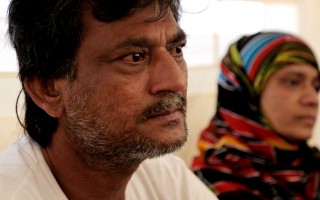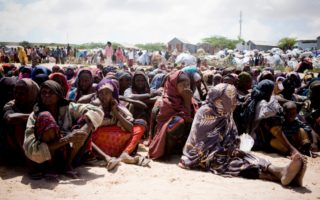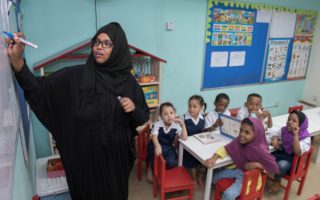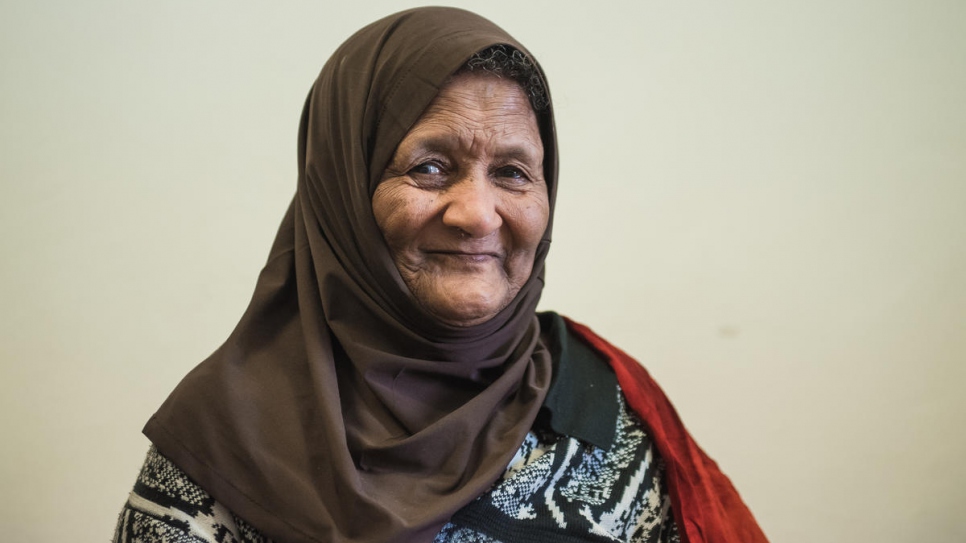
Somali grandmother Fadumo Nour Zein, 81, awaits resettlement from Syria at UNHCR’s emergency transit centre in Timisoara, Romania. © UNHCR/Ioana Epure
Somali refugee Fadumo Nour Zein, 81, sits on a metal bed in a UNHCR centre in western Romania, patting the knee of her 46-year-old daughter Fatima on her left and grandson Ali on her right. After years of uncertainty, she is finally happy.
For 20 years Fadouma did not know whether her daughter, one of two adult children, was even alive. Fadumo’s husband, Ali Mohamed Zein, is listed on UNHCR documents as 85, though in fact no one knows how old either husband or wife is. They got married so long ago that Fadumo jokes she does not even remember their wedding.
The pair stayed in the Somali capital, Mogadishu, through 17 years of war. It was not until life in their neighbourhood became unbearable that they booked a flight to Syria in 2008. They never suspected war would also break out there, just three years later.
“It was scary,” she says of the Syrian war that started in March 2011. “We started remembering the war back home” as they were displaced within Syria.
As they grew older and frailer – Fadumo’s husband is now blind, deaf and shows the after-effects of a stroke – they were cared for by fellow Somali refugees. But soon, the kind souls who looked after them gradually left to start new lives elsewhere.
To add to their distress, Fadouma and Ali Mohamed lost touch with their older daughter Fatima when she left Mogadishu in 1991.
Even by the standards of nomadic Somali refugees and emigres dispersed across the globe by the collapse of the central government in 1991 and decades of subsequent war and lawlessness, the story of Fadumo and her daughter is remarkable for the many separations and reunions that might beggar belief in a Hollywood film.
In Somali exile society in Syria, rich in storytelling, Fadumo stumbled upon an obscure connection that turned laments over a lost daughter into a reunion in 2010. She learnt that Fatima had gone to Germany, then become a refugee in the UK, and lost her husband to what Fatima says was a medical error during an operation.
“I cried from joy… there is no way to describe how I felt.”
Recalling the phone call that reunited the two women, the mother says “I cried from joy.” Fadumo was so astonished to learn her daughter was alive, “there is no way to describe how I felt.”
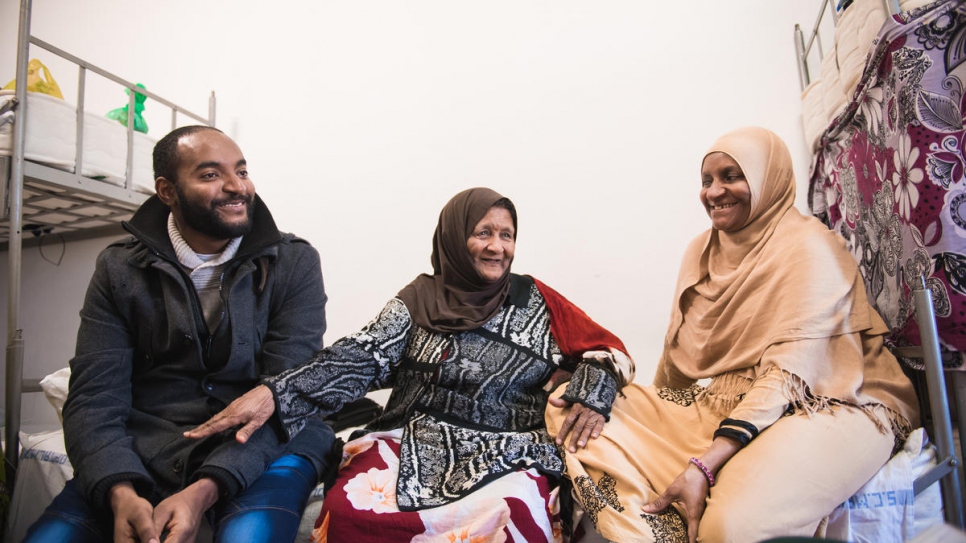
Fadumo Nour Zein, 81, sits between her daughter Fatima and grandson Ali. Fadumo had lost touch with Fatima when she fled Somalia in 1991. © UNHCR/Ioana Epure
Fatima flew to Syria to meet her parents and was shocked to find her father – a formerly vigorous man who had been a security guard for several embassies in Mogadishu – greatly diminished by his stroke. Now, at the Emergency Transit Centre (ETC) in Timisoara, Fatima and her son Ali take turns lovingly feeding him.
Soon after that 2010 reunion, Fatima, a UK citizen, began working to get her parents admitted to the UK under a family reunification scheme. In three days, her efforts will finally pay off. Ali and Fatima spent a lot of their own money coming to Timisoara and staying here to guide Fadumo and Ali Mohamed to the place where they will spend their final years.
“I am happy I am going with my daughter,” says Fadumo, an affectionate, wizened woman with an easy smile and a twinkle in her eyes. “I did not see her for all those years. I’ll be happy to be with my daughter, my grandson and all his children,” she adds, putting light-hearted pressure on 24-year-old Ali, who is not yet married and certainly does not have any children.
“I just want to have peace.”
Ali, who owns his own small IT business, has moved out of his mother’s modest London apartment to make room for his grandparents. Fatima, who makes her living as a caregiver, has modified the apartment to accommodate her disabled father and is prepared to turn her skills to taking care of them as well as her clients.
As Ali and Fatima tell it, these are small sacrifices to make for the sake of family unity after a lifetime of displacement and hopes of reunion.
At the ETC, a safe place for refugees to stay while their resettlement case is completed, Fadumo and Ali Mohamed are also tended by a fellow Somali refugee named Ruqia* who once kept a friendly eye on them in Syria. “I call her my daughter,” Fadumo says of Ruqia. “It reassures her to see me here,” chimes in Ruqia, who is to depart for Bradford, England a few days later.
As she shuttles from a dormitory-style room for women to the all-male room where her husband spends most of his time in bed, Fadumo muses on the changes ahead in the UK, hopefully the last country she will call home.
“I just want to have peace,” she says. “I went to Syria and I thought there would be peace. But then the war started. I hope war will not start in London.”
Written by Kitty McKinsey in Timisoara, Romania. This article originally appeared in unhcr.org
UNHCR is running an emergency appeal during the month of Ramadan to sponsor Somali and Yemeni refugees. Please donate now to help refugees like Ali and Fatima.



